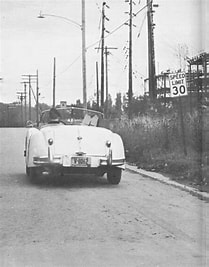
These characters each depict the word “Chinese” in the three styles of writing that are used: formal, simplified and classical.
In the summer of 1961, I left my job in Harlem where I was working with gang members as a community worker for a student life at Yale that catapulted me from clamorous chaos to hushed academia. The ten-week summer intensive Chinese language program ushered students into classes for six hours a day, followed by rigorous evening solitary memory exercises. The goal was to converse and be able to write 300 Chinese characters.
In the summer of 1961, I left my job in Harlem where I was working with gang members as a community worker, for a student life at Yale that catapulted me from clamorous chaos to hushed academia.
Yale’s course was unexpectedly fun. A mixed bag of serious and curious students. Included were Jay Rockefeller who had lived in Japan studying Zen. We often made fun of our text. In one exercise, we learned to read the simple Chinese sentence, “China is big with a large population (Zhongguo da, jenkou dwo).” Ridicule prevailed with equally vapid sentences like, “Violins are small, noise is big (Erhu xiao, shengyin da).” Our two language teachers were ex-missionaries who had studied, so they said, in China. They each had a great sense of humor, sharing unrefined language from their rural lives. Later we discovered they had been terminated for misrepresenting their academic credentials. But, despite their questionable backgrounds, they made the language come alive, the classes interesting, and the atmosphere relaxed.
My apartment experience moved from roommate chaos to a romantic encounter. Desperately needing a place to stay, I began reading available “for rent” ads in the newspaper and bulletin board postings. I found a building near the University that offered a room with a shared kitchen. Ascending the stairs to the second floor, two clean young men greeted me. They were in need of a roommate who would also be a housesitter while they were vacationing in Europe. Having only one suitcase, it was easy to bring my belongings up. I had no idea who these men were. They dressed casually in khakis with open-collared shirts. Pleasantly social, we ate the first meal together. I went to bed early. In the middle of the night a light flashed in my room from high up on the wall. I thought someone was on the edge of my bed preparing to attack me. My martial arts instincts, coupled with my recent gang experiences in Harlem, lifted me to my feet ready to defend. The dark room provided no purchase on the enemy. I waited while warily watching the light track from one wall to another and disappearing out of the bedroom. Soaked in sweat I
ran out into the hallway shouting to my roommates. The young men apologized. They had forgotten to tell me that they operated a toy train on raised rails through the rooms.
They left soon thereafter, leaving me alone. I slowly figured out that they were a couple. They looked like pure Mormon missionary boys spending time together. We never talked of women, of drinking, dancing, or entertainment. Their departure made it feel as though they were never there—only the train.
Loneliness dented my undergraduate social life in Berkeley. Habitual community work dominated my life in the Harlem neighborhood. At Yale, there was one woman sitting in the next aisle two seats in front of me. I was attracted by her hair flowing down her back, her seriousness, and her forceful voice. I was too timid to ask her out.
An attractive student from Smith who was supremely intelligent, a lonely Quaker, befriended me. So much so she spent a night—without the train! The next day, she asked if she could move in with me. She explained that her roommate was a disaster, the apartment was dirty, and the atmosphere was inappropriate for studying Chinese. I had an apartment with three bedrooms—plenty of privacy to study, sleep (when necessary) with a kitchen to prepare meals. We shared similar values about social change, pacifism, and the commitment to study Chinese.
Competing with classes was my pursuit of conscientious objector status. I hired an anti-war lawyer to counsel me on how to handle my Selective Service hearing in Bridgeport. I wrote a long defense of my Jewish commitment. When the day arrived, in the sixth week of classes, I appeared for my trial. The Selective Service judge was very suspicious. He referenced my FBI report which falsely reported my violent behavior as a martial arts student involved in fighting, my dishonesty in conning friends to believe that I was joining the Jewish Seminary in Cincinnati, and cheating my landlord by not paying my rent on time. My stepfather did not defend my position. What really thrashed me was (required) participation in ROTC. Since I did have a brief pre-med background, the judge decided that I should be recruited as a medic. He pointed out that medics were not armed. Instead of being honest telling him I was afraid to be in the military, I restated the political reason for not accepting his decision: as a medic I would want to treat the wounded, friend or foe, equally. If I did, I would be punished.
I immediately appealed to the state Selective Service board in California, my home district. I applied to enter Yale graduate school and was rejected. I wrote to my professors at Berkeley who helped me gain acceptance into the M.A. Chinese history program.
I had originally thought I would be denied my petition, thus resulting in a prison term in Danbury. There I would study another
300+ Chinese characters. Change in plans. Hurriedly prepared for the return to Berkeley. The last week of Chinese class, my romantic roommate and I took a faux honeymoon in Maine. Because of the Puritan attitudes toward premarital sex, I bought a very cheap ring for her which we could show to the motel manager. We had a fulfilling time.
Chaos returned vigorously upon our return from Maine. I had a loving relationship with a girl in Massachusetts during my work in the children’s mental hospital the previous summer. I expected to continue this relationship. However, a phone call late one night from a female friend informed me that this love of mine was planning to propose marrying me now. This was not a congratulatory call. My friend informed me that my past companion just found out she was pregnant by someone else whom she did not wish to marry. I was being lured into a marriage, not only while she secretly carried another person’s child, but someone with a great temper. Furthermore, I worried about being an unavailable father in graduate school and the possibility of spending time in jail if I did not obtain my conscientious objector status.
I packed. Started my car. Pointed my car west and took off for California….






Quite a tangled tale, Richard! I think the real love of this story are those Chinese characters. Your Smith roommate is intriguing, but the one carrying another man’s child was an interesting twist. That Jewish seminary back in Cincinnati has been my brother’s professional home for almost 45 years (he was ordained in 1974, received his PhD in Rabbinic Thought from Brown in 1977, taught at Brown for a year, but returned to teach at HUC in 1979 and has been there ever since. He – Richard Sarason – is now head of the graduate school).
Dear Betsy:
You are correct. My love of East Asian studies has carried me through many crises.
Yes, It is tangled. That was my purpose to show: learning, unrequited love, escape. I definitely hope it did not obstruct the narrative or meaning. I am a social scientist. So any suggestions for making me more of a writer are welcomed.
• I am several steps below your husband’s education. Did get a certificate from the University of Judaism in Los Angeles. I spent a summer in Israel on a Moshav. But these are other stories.
Wow, we knew you were the conscientious objector type Richard, but didn’t know your checkered romantic past! And that model train running thru the apartment – how strange!
Looking forward to more intrigue from you!
That was a fun story!
Sometimes I have entertained the thought that I was born somewhat too late. This is usually when I regret missing the whole free love, Summer of Love etc. era. Then I remember that had I been old enough for that, I’d have to have figured out a way to stay out of McNamara’s Little SE Asian Adventure. I was not nearly principled enough to apply for CO status (and it wouldn’t have flown anyway) nor to go to prison. I freely admit that my main objection to that war was the possibility of me getting killed or maimed in it. I did strategize a bit as I hit my early teens, read the death notices in the hometown papers, and it seemed that the war would be eternal. My plan was to join the Navy and sit it out on a relatively safe ship somewhere.
Your being warned off the marriage proposal reminded me of the last year of my first marriage, when I began to fear that my wife would try to keep us together by stopping her birth control. Knowing her, that was not a far-fetched concern. That led to my having a twelve month headache.
Dale
I am heartened to meet a fellow with a similar experience
My mother somewhat berated me declaring “I will raise her child”. This would free me to study and even marry. M
I like Betsy’s interpretation–that the Chinese characters attracted you more than the women. And I liked those instructors who got fired! Who says you have to have the right credentials to be a good teacher?
Thanks for the “tales of the heart.”
Dear
Betsy has a fine. My theme was that my romances existed inside my tangle of leavin the thre ants in Harlem to what I thought would be a quiet life of study. I found new hurdles.
Thank you both